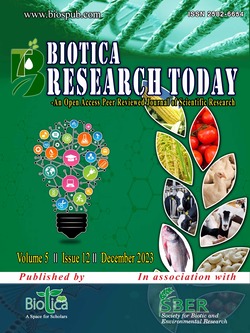
Sustainable Biofuel Production: Second Generation Ethanol from Agricultural Waste
Jinisha Blessie J.P.*
Dept. of Microbiology, College of Agriculture, Vellayani, Thiruvananthapuram, Kerala (695 522), India
Anu Rajan S.
Dept. of Microbiology, College of Agriculture, Vellayani, Thiruvananthapuram, Kerala (695 522), India
Chitra N.
Dept. of Microbiology, College of Agriculture, Vellayani, Thiruvananthapuram, Kerala (695 522), India
Soumya V.I.
Dept. of Microbiology, College of Agriculture, Vellayani, Thiruvananthapuram, Kerala (695 522), India
DOI: NIL
Keywords: Enzymatic hydrolysis, Fermentation, Pretreatment, Second-generation ethanol
Abstract
As the global demand for sustainable energy continues to rise, there is a growing focus on researching and developing second-generation ethanol obtained from agricultural waste. Increasing concerns on climate change and energy security prompted the significant attention towards utilizing non-food biomass for bioethanol production. Second-generation (2G) ethanol, derived from non-food sources like agricultural waste, forest residues and other non-edible plant parts, is considered more sustainable compared to first-generation ethanol, which comes from food crops like sugarcane and corn. Agricultural waste, comprising crop residues, straw, husks and other organic materials remaining after harvest, stands out as a promising raw material for second-generation (2G) ethanol production. Sustainable production of second-generation (2G) ethanol from agricultural waste presents an environmentally friendly and economically feasible alternative to conventional fossil fuels.
Downloads
not found
Reference
Sarwal, R., Kumar, S., Mehta, A., Varadan, A., Singh, S.K., 2021. Roadmap for ethanol blending in India 2020-25. NITI Aayog Publishers, Ministry of Petroleum and Natural Gas, Government of India. p. 72. URL: https://www.niti.gov.in.
Zheng, G.J., Zhou, Y.J., Zhang, J., Cheng, K.K., Zhao, X.B., Zhang, T., Liu, D.H., 2007. Pretreatment of rice hulls for cellulase production by solid substrate fermentation. Journal of Wood Chemistry and Technology 27(2), 65-71. DOI: https://doi.org/10.1080/02773810701486675.
